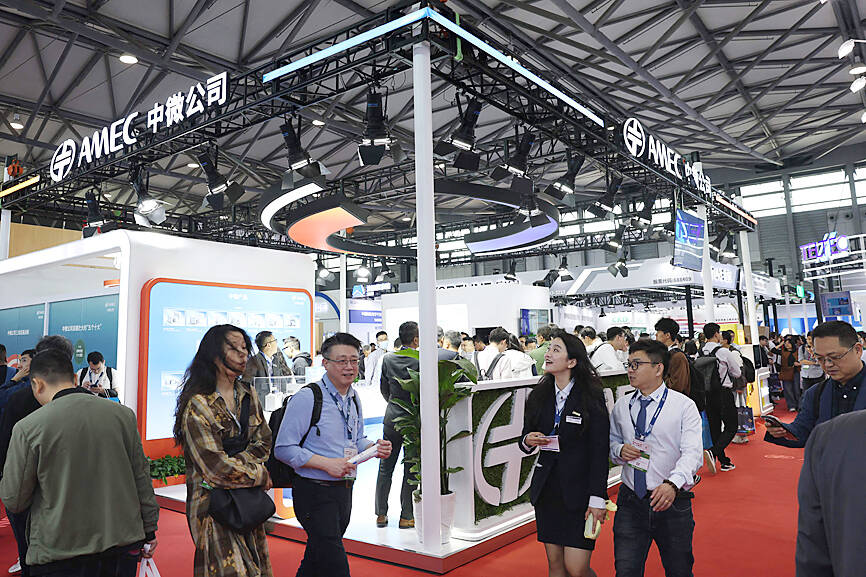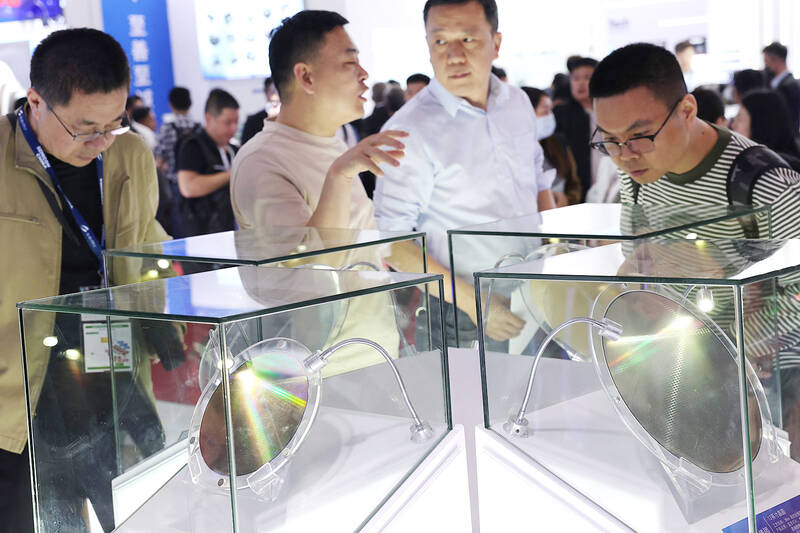China would continue to invest more in new computer chipmaking equipment than any other geographical region this year, despite a significant year-over-year decline, followed by South Korea and Taiwan, industry group SEMI said in a report yesterday.
In its fabrication plant spending forecast, SEMI said global investments in gear would rise 2 percent this year to US$110 billion, the sixth consecutive year in a row of growth, due to investment in tools needed to make chips for artificial intelligence (AI).
The impact of AI would likely be even stronger next year, SEMI added, when investment is expected to grow by another 18 percent.

Photo: AFP
China is the largest consumer of chips, and firms there have been expanding chipmaking capacity for years, but they began a huge sprint in mid-2023 and last year with government support, as part of a drive to lessen dependence on imported chips in response to restrictions imposed by the US government.
ASML Holding NV, the largest chip equipment manufacturer, forecasts sales of 32 billion to 38 billion euros (US$34.5 billion to US$40.9 billion) for this year, implying market share of more than 25 percent for its sub-sector, lithography, where it enjoys a dominant position.
Other top equipment firms include Applied Materials Inc, KLA Corp, LAM Research Corp and Tokyo Electron Ltd, though Chinese equipment makers such as Naura Technology Group Co (北方華創), Advanced Micro-Fabrication Equipment Inc (AMEC, 中微半導體) and Huawei Technologies Co (華為) affiliate SiCarrier Technologies Co (新凱來) are growing fast.

Photo: AFP
Chinese spending is expected to fall to US$38 billion this year, down 24 percent from US$50 billion last year, but still ahead of US$21.5 billion in South Korea, where SK Hynix Inc and Samsung Electronics Co are expanding capacity for memory chips.
Spending in Taiwan, where leading foundry Taiwan Semiconductor Manufacturing Co (台積電) manufactures AI chips for Nvidia Corp and others, is projected at US$21 billion.
Among other regions, the Americas and Japan are each expected to spend US$14 billion this yaer, while Europe would spend US$9 billion, SEMI said.

In Italy’s storied gold-making hubs, jewelers are reworking their designs to trim gold content as they race to blunt the effect of record prices and appeal to shoppers watching their budgets. Gold prices hit a record high on Thursday, surging near US$5,600 an ounce, more than double a year ago as geopolitical concerns and jitters over trade pushed investors toward the safe-haven asset. The rally is putting undue pressure on small artisans as they face mounting demands from customers, including international brands, to produce cheaper items, from signature pieces to wedding rings, according to interviews with four independent jewelers in Italy’s main

Japanese Prime Minister Sanae Takaichi has talked up the benefits of a weaker yen in a campaign speech, adopting a tone at odds with her finance ministry, which has refused to rule out any options to counter excessive foreign exchange volatility. Takaichi later softened her stance, saying she did not have a preference for the yen’s direction. “People say the weak yen is bad right now, but for export industries, it’s a major opportunity,” Takaichi said on Saturday at a rally for Liberal Democratic Party candidate Daishiro Yamagiwa in Kanagawa Prefecture ahead of a snap election on Sunday. “Whether it’s selling food or

CONCERNS: Tech companies investing in AI businesses that purchase their products have raised questions among investors that they are artificially propping up demand Nvidia Corp chief executive officer Jensen Huang (黃仁勳) on Saturday said that the company would be participating in OpenAI’s latest funding round, describing it as potentially “the largest investment we’ve ever made.” “We will invest a great deal of money,” Huang told reporters while visiting Taipei. “I believe in OpenAI. The work that they do is incredible. They’re one of the most consequential companies of our time.” Huang did not say exactly how much Nvidia might contribute, but described the investment as “huge.” “Let Sam announce how much he’s going to raise — it’s for him to decide,” Huang said, referring to OpenAI

The global server market is expected to grow 12.8 percent annually this year, with artificial intelligence (AI) servers projected to account for 16.5 percent, driven by continued investment in AI infrastructure by major cloud service providers (CSPs), market researcher TrendForce Corp (集邦科技) said yesterday. Global AI server shipments this year are expected to increase 28 percent year-on-year to more than 2.7 million units, driven by sustained demand from CSPs and government sovereign cloud projects, TrendForce analyst Frank Kung (龔明德) told the Taipei Times. Demand for GPU-based AI servers, including Nvidia Corp’s GB and Vera Rubin rack systems, is expected to remain high,